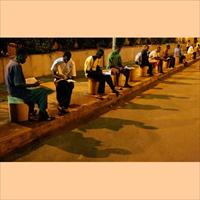CONGO: More children on the streets

Louya, a 16-year-old boy begging in the Fonde market of Pointe-Noire, Congo's southern port city, said he was an orphan who had lived on the streets since 1997.
"Muké na satu, muké na satu ['I am hungry, I am hungry' in Kituba]," he beseeched passersby.
Like Louya, several other barefoot boys and girls were begging for money or doing odd jobs to pay for food.
The children are part of a growing number living on Congo's streets, say specialists. According to Florent Niama, managing director of the NGO l'Action Sociale, their number is estimated at around 3,000, but the phenomenon "is growing in [Congo's] cities".
And it is not just in Pointe-Noire, where the NGO Samu Social estimates more than 500 live on the streets, or in the capital, Brazzaville. In Dolisie, a city in the southwest, hundreds of children fend for themselves each day.
Analysts attribute the growing phenomenon to deteriorating social conditions within the family, witchcraft and parental negligence. Armed conflicts in the country had also contributed, they add.
According to the UN Children's Fund (UNICEF), Congo has continued to feel the effects of a decade-long brutal civil war that ended in 2003, displaced millions of people and ravaged the economy.
The war left in its wake thousands of children without birth certificates, young girls with babies from unknown fathers, and child soldiers needing demobilisation and reintegration into civil society.
Training programmes
In a bid to respond to the problem of street children, the government has since 2004 launched two programmes. First, it established a centre for the reintegration of vulnerable children, providing food, schooling and training in leatherwork, dressmaking and baking.
Then, with UNICEF, it launched a project to reintegrate them into families in August 2005. The project is being implemented in Brazzaville and Pointe-Noire.
So far, 40 children have been identified and reunited with their families in Brazzaville. Another 22 have gone back to school while 16 are undergoing training. In Pointe-Noire, 37 children have been identified, of whom 17 were reunited with their biological families - but five went back to the streets.
The project, which works with various NGOs, has also trained officials from the government's department of social affairs on the care and reintegration of street children, according to a progress report.
"Our approach consists of providing shelter for children with difficulties to stabilise them before finding an appropriate solution - whether social or family reintegration," Josué Nlemvo Ntelo, coordinator of one of the NGOs, Association Espace Enfant (AEE), told IRIN in Pointe-Noire.
The NGO, which was established in 1997, looks after children in vulnerable situations, and also has an education centre. It shelters 26 children, some from families living in precarious conditions.
Trafficking
Congolese authorities have also had to deal with increasing trafficking of children, mostly for labour.
A report prepared by UNICEF and the Congolese government in 2007 estimated that 200,000 children were affected by trafficking every year across the central and West African region.
Many of these children were orphans or unaccompanied following the civil wars, according to local NGOs. Since 2006, for example, Action Against the Trafficking of West African Children (ALTO) has dealt with almost 100 cases and helped repatriate about 50 in Pointe-Noire.
 Back and Next - Back and Next
Back and Next - Back and Next See Also - See Also
See Also - See Also